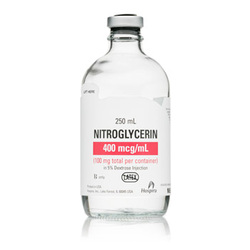Pharmacology definition - Nitroglycerin

Nitroglycerin
Nitroglycerin is useful in treating patient with angina, heart failure and pulmonary edema. Nitroglycerin may carry side effects such as orthostatic hypotension, headache and transient compensatory tachycardia.
Nitroglycerin may include isosorbide mononitrate and isosorbite dinitrate. Nitroglycerin will increase cGMP synthesis by stimulating guanylate cyclase. Increased in the cGMP may lead to dephosphorylation and deactivation of the myosin light chain. This will finally lead to relaxation of the smooth muscle. Nitroglycerin will be converted to nitric oxide.
Nitroglycerin will effect the smooth muscle of the veins and causing relaxation of the coronary artery smooth muscle. This will lead to pooling of the blood into the vein. Finally it will lead to reduction in preload.
